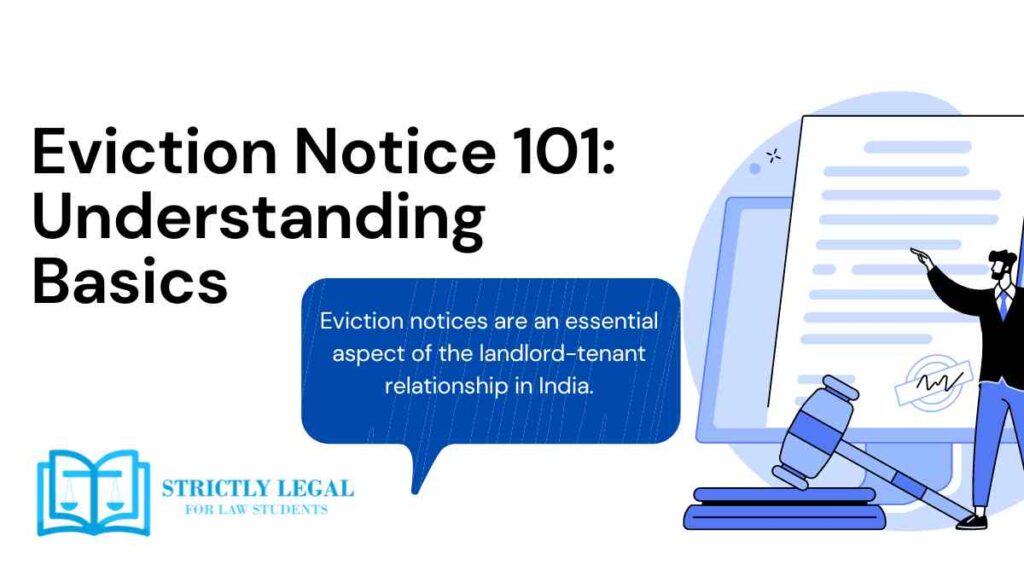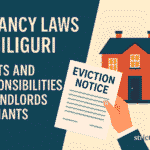Eviction notices are an essential aspect of the landlord-tenant relationship in India. They are legal documents that outline the grounds and procedures for ending a rental agreement and seeking possession of a rented property. Understanding an eviction notice is crucial for both landlords and tenants to ensure compliance with applicable laws and protect their rights. In this comprehensive guide, we will delve into the basics of eviction notices in India, including the legal framework of eviction notices, grounds for eviction, rights, and protections for tenants, eviction notice format, and other information.
Table of Contents
What is Eviction?
Eviction is a legal process in which a landlord removes a tenant from a rental property for reasons such as breach of lease terms, non-payment of rent, or other violations of the rental agreement. It typically involves the issuance of an eviction notice, followed by a formal legal process that may include court hearings and a court order for the tenant to vacate the property. Evictions can have serious legal and financial consequences for both landlords and tenants, and it is important to understand and follow the laws and regulations governing eviction procedures in the relevant jurisdiction.
What is Eviction Notice?
Eviction notice refers to a legal document issued by a landlord to a tenant, notifying them to vacate the rented premises within a specified period of time. An eviction notice meaning can simply be a formal communication from the landlord to the tenant, stating the grounds for eviction and the timeline for vacating the property.
The eviction process starts right after the eviction notice form is given to the tenant. If the tenant fails to come up with a remedy then the landlord can proceed with the eviction, with the legal court ways.
Grounds to Send Eviction Notice
An eviction notice can be given to the tenant by a landlord on various grounds. The landlord has the authority to give eviction notices for anti-social behavior or even for cases of rent payment. Below are some concrete reasons of eviction:
| Reason for Eviction | Description |
|---|---|
| Non-payment of rent | Tenant has failed to pay rent as per the lease agreement or rental agreement terms. |
| Violation of lease terms | Tenant has breached the lease agreement terms, such as subletting without permission, unauthorized alterations, or causing damage to the property. |
| Expiry of lease agreement | The lease or rental agreement has reached its expiration date, and the landlord does not wish to renew or extend it. |
| Illegal activities | Tenant has engaged in illegal activities on the premises, such as drug trafficking or illegal business activities. |
| Nuisance or disturbance | Tenant has caused disturbance to other tenants or neighbors, such as excessive noise, harassment, or illegal activities. |
| Health and safety violations | Tenant has caused health or safety violations on the property, such as hoarding, failure to maintain cleanliness, or creating unsanitary conditions. |
| Unauthorized occupants | Tenant has allowed unauthorized occupants to reside in the property without the landlord’s permission. |
| Property damage | Tenant has caused significant damage to the property beyond normal wear and tear, and failed to repair or compensate for it. |
| Non-compliance with rules and regulations | Tenant has failed to comply with the rules and regulations of the property, such as parking restrictions, smoking policies, or pet policies. |
It’s important to note that the specific grounds for eviction may vary depending on the laws and regulations of the respective state or jurisdiction in India. Landlords must follow the applicable laws and procedures when issuing eviction notices to ensure compliance and protect their rights. At the same time, tenants have the right to contest the eviction in court and seek legal assistance if needed.
Information Included in a Tenant Eviction Notice
When issuing a legal eviction notice, it is important to include specific details such as the terms of the tenancy agreement, the parties involved, the purpose of the notice, and the deadline for the tenant to address the issue before further legal action is taken. Here are the points to be included in the eviction notice to tenant format.
- Addresses of the rental property
- Address of the landlord
- Tenant name (the one who pays the rent or everyone who has occupied)
- Status of the lease
- Date of lease
- Reason for the notice (the type of notice being issued for eviction)
- Date when the landlord signs the notice
- Proof of service
When creating an eviction notice, it is important to ensure that it complies with the legal requirements of your jurisdiction and seek legal advice if needed.
How to send the Eviction Notice to Tenant?
| Steps to Send Eviction Notice | Description |
|---|---|
| Step 1: Review Applicable Laws | Familiarize yourself with the relevant eviction laws and regulations in your location, such as the Rent Control Act, the Transfer of Property Act, and any other local laws that apply. |
| Step 2: Determine Valid Grounds | Ensure that you have valid grounds for eviction as per the applicable laws, such as non-payment of rent, violation of lease terms, expiry of lease agreement, illegal activities, property damage, etc. |
| Step 3: Prepare the Eviction Notice | Draft a formal eviction notice in accordance with the applicable laws, including the reasons for eviction, timeline for vacating, and any other relevant details. Seek legal assistance or use a template to ensure legal compliance. |
| Step 4: Serve the Eviction Notice | Serve the eviction notice to the tenant in a proper manner as per the applicable laws, such as delivering it in person, sending it via registered post with acknowledgment due, or as specified by local laws. Keep a record of the delivery of the notice. |
| Step 5: Follow Prescribed Timeline | Adhere to the timeline mentioned in the eviction notice, as per the applicable laws, for the tenant to vacate the property. Do not take self-help measures, as it may be illegal. |
| Step 6: Seek Legal Assistance if Needed | If the tenant contests the eviction or if you encounter any legal challenges, seek legal assistance from a qualified lawyer to ensure compliance with laws and protect your rights as a landlord. |
Please note that eviction laws and procedures can vary depending on the location and circumstances in India. It’s always best to consult with legal professionals and follow the applicable laws and regulations when sending an eviction notice.
An eviction notice should be delivered to the tenant in accordance with the laws and regulations of the jurisdiction where the property is located. This may include methods such as hand delivery, posting on the rental property, or sending by certified mail.
If a tenant receives an eviction notice, they should carefully review the notice and the grounds for eviction. They may have legal rights and options to respond, such as paying overdue rent, correcting lease violations, or seeking legal assistance to challenge the eviction.
If a tenant does not comply with an eviction notice, the landlord may need to file a lawsuit and go through the legal process of eviction, which may involve a court hearing and a formal eviction order. It is important to follow the legal procedures and seek legal advice if necessary.
Yes, a tenant may have the right to challenge an eviction notice in court if they believe it is not valid or if they have legal defenses, such as improper notice, retaliation, discrimination, or habitability issues. It is advisable to seek legal assistance to protect their rights and interests.
The consequences of an eviction may include being forced to vacate the rental property, losing the security deposit, having an eviction record on the tenant’s rental history, and facing potential legal and financial repercussions. It is important to understand the implications of an eviction and take appropriate action.
Debasmita Kundu is an aspiring writer and beginner WordPress developer based in India. She has a Bachelor’s degree in English Literature and is currently pursuing a Master’s degree in Journalism and Mass Communication.
With a strong interest in technology and a passion for writing, Debasmita is exploring the world of WordPress development and learning new skills to build beautiful and functional websites. She enjoys experimenting with different themes, plugins, and customization options to create unique websites that stand out from the crowd.
As a beginner in the field of WordPress development, Debasmita is eager to learn and grow and is excited about the possibilities that this field offers for creativity and innovation.




